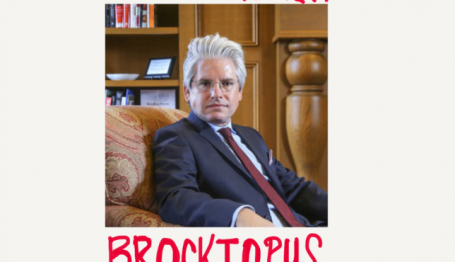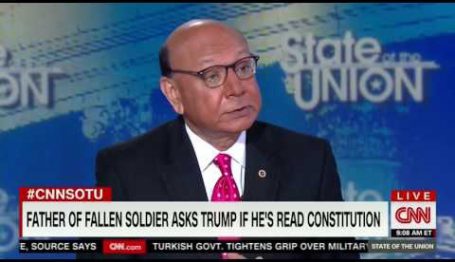2016 Conventions
Trump, traitor (and the truth comes limping after)
Falsehood flies, and truth comes limping after it, so that when men come to be undeceived, it is too late; the jest is over, and the tale hath had its effect . . .
– Jonathan Swift
PHILADELPHIA, PENNSYLVANIA — How has Hillary Clinton survived in politics, and risen to her current position of trust, despite the fact that most people have an accurate impression of her character? Because the Clintons have an army of sycophants, ready to lie for their cause at a moment’s notice, and to smear anyone who dares criticize or otherwise challenge them.
Today, they started calling Donald Trump unpatriotic, disloyal to his country, practically a traitor.
To justify their characterization, they twisted his words from a press conference that he held today in Doral, Florida.
As is known to most people who follow the news, intelligence analysts believe that the Russians probably hacked into the server to which Hillary Clinton, when she was secretary of state, diverted stolen e-mails. That means the Russians probably have copies of at least some of the e-mails that Clinton destroyed.
Clinton has admitted to diverting some 66,000 e-mails, of which she returned roughly half. She claimed that the other half related to private matters such as yoga classes and plans for her daughter’s wedding. She claimed that her lawyers—who, importantly, lacked the proper security clearances to handle such material—reviewed the e-mails to determine which ones were personal and which were work-related.
Clinton claimed that the supposedly personal e-mails were deleted. It is those e-mails to which Trump referred at the press conference today.
Trump, half-jokingly, called on the Russians to turn over those copies. “Russia, if you’re listening, I hope you’re able to find the 30,000 emails that are missing,” Trump said. He added sarcastically: “I think you will probably be rewarded mightily by our press.”
Trump said that he hoped that Russia has the deleted e-mails.
“She gets subpoenaed, and she gets rid of 33,000 e-mails? That gives me a problem. Now, if Russia or China or any other country has those e-mails, I mean, to be honest with you, I’d love to see them.”
He said, “They probably have her 33,000 e-mails that she lost and deleted because you’d see some beauties there. So let’s see.”
Katy Tur, an NBC reporter, asked preposterously whether he was encouraging a foreign country to hack into e-mails, Trump replied: “Be quiet. I know you want to save her,” meaning Clinton.
About 15 minutes after the press conference, Trump reiterated his point about the e-mails, via Twitter: “If Russia or any other country or person has Hillary Clinton’s 33,000 illegally deleted e-mails, perhaps they should share them with the FBI!”
Anti-Trump forces pounced on Trump’s remarks—or, at least, his remarks as they reinterpreted them. Misstating Trump’s point deliberately or through stupidity, they claimed that he was calling on the Russians to hack into Clinton’s e-mail.
Almost immediately after the comments, at 11:54 a.m., the New York Times falsely tweeted: “Donald J. Trump called on Russia to hack Hillary Clinton’s email, essentially sanctioning a foreign power’s cyberspying.”
The online New York Times story read: “Donald J. Trump said Wednesday that he hoped Russia had hacked Hillary Clinton’s email, essentially encouraging an adversarial foreign power to cyberspy on a secretary of state’s correspondence.” The logic goes this way: By hoping the Russians did something in the past, Trump was encouraging them to do it in the future. Plus, he was encouraging the Russians to “cyberspy” on messages that, if Clinton is telling the truth, no longer exist.
Others quickly spread the tale of Trump’s perfidy.
“This has to be the first time that a major presidential candidate has actively encouraged a foreign power to conduct espionage against his political opponent,” said Jake Sullivan, Mrs. Clinton’s chief foreign policy adviser. “This has gone from being a matter of curiosity, and a matter of politics, to being a national security issue.”
Clinton campaign manager Robby Mook attacked Trump while seeming to admit that the missing e-mails—which Clinton claimed were merely personal—were matters of national security. “This is a national security issue now and the idea that you’d have any American calling for a foreign power to commit espionage in the U.S. for the purpose of somehow changing an election, I think, that we’re now in a national security space,” he said.
On CNN, David Gregory, former host of NBC’s Meet the Press, sputtered his response to Trump:
I’ve run out of words to express my shock, and how completely beyond the pale that Donald Trump is as a potential leader of the free world, the commander-in-chief of our country. This was truly beyond the pale. I mean, he is encouraging Russia, which by all accounts was behind the leak of one of our major political parties, to do more, to go beyond, to try to hack into Hillary Clinton’s server to find missing e-mails to kind of get in the middle of the scandal. It’s as if this is a child playing with matches who doesn’t understand how badly he and the country can get burned. . . . And I don’t think there’s anybody who would think that was anything but a fair reading of what we’ve seen here.
The lie spread through the Twitterverse like a virus.
“Trump has just public called on Russia to cyber-invade the United States to help him get elected: talk about high crimes & misdemeanors,” tweeted Philip Gourevitch of the New Yorker.
Benjy Sarlin of NBC News: “This is mindblowing. Basically asking foreign power to intervene on his behalf on camera.” He called Trump’s comments “embossed invitations to attack” the U.S.
Jeffrey Goldberg of The Atlantic: “Trump just asked Russia to spy on his rival, dig up classified U.S. government documents, and release them publicly. How is this happening?” Later, Goldberg added, “He’s just too nuts to be president.”
Philip Rucker of the Washington Post: “Remarkable that a presidential nominee is pleading with a foreign state actor to hack & release a political opponent’s private emails.” (Note: The e-mails in question are ones that were “private” only according to Clinton’s absurd claims—30,000 e-mails about her daughter’s wedding and other personal matters.)
David Mack of BuzzFeed: “Trump, after denying he told Putin what to do, expressly asks Russia to hack Clinton’s server to find missing emails[.]”
Other responses:
The left-wing magazine Rolling Stone quoted Trump accurately, but added, as spin, that he “seemingly encouraged a cyber-attack against Hillary Clinton.”
The Miami Herald reported: “In a surprising call for a foreign power to use its hacking abilities to get involved in the U.S. presidential election, Donald Trump on Wednesday called on Russia to find Hillary Clinton’s missing emails from the time she was secretary of state.”
CNN’s website: “Donald Trump appeared to call on Russian intelligence agencies Wednesday to find 30,000 of Hillary Clinton’s deleted emails, adding a stunning twist to the uproar over Moscow’s alleged intervention in the presidential election.”
Vanity Fair, in a story headlined DONALD TRUMP JUST GAVE HIS MOST UNHINGED PRESS CONFERENCE YET, reported: “Trump calls on a foreign power to commit an act of cyber-espionage.”
One of the weirdest responses came from CNN legal analyst Steve Vladeck. Vladeck conceded that there was “no real argument that Mr. Trump’s comments were tantamount to treason.” (This was, CNN reported, “despite an outpouring on social media calling his comments disloyal.”) Vladeck explained that the Constitution strictly limits the definition of treason, such that Trump’s comments today were not technically treason, but that Trump could have broken a law that makes it a crime for an individual to induce others to commit felonies involving physical force against American property, “which almost certainly includes cyberhacking.”
Leon Panetta, a former defense secretary and CIA director, suggested that Trump was being disloyal to the country. “No presidential candidate who’s running to be president of the United States ought to be asking a foreign country, particularly Russia, to engage in hacking or intelligence efforts to try to determine what the Democratic candidate may or may not be doing,” Panetta said in an interview with leftwing CNN personality Christiane Amanpour. “This just is beyond my own understanding of the responsibilities that candidates have to be loyal to their country and to their country alone, not to reach out to somebody like Putin and Russia, and try to engage them in an effort to try to, in effect, conduct a conspiracy against another party.”
Panetta addressed the Democratic National Convention tonight. His prepared remarks were altered this afternoon to add this attack on Trump’s patriotism: “Donald Trump today once again took Russia’s side. He asked the Russians to interfere in American politics. Think about that for a moment. Donald Trump, who wants to be president of the United States, is asking one of our adversaries to engage in hacking or intelligence efforts against the United States of America to affect our election.” (The rhythm of Panetta’s speech was broken just as he was about to deliver that section of his remarks, as dissident delegates and alternate delegates began chanting “No more war.”)
Conservatives were not immune to the contagion. Radio talk show host Steve Deace: “I cannot believe an American presidential candidate just said he hopes the Russians acquire potentially sensitive security intel.” Ben Howe of RedState: “The guy saying he’ll build a wall to protect American sovereignty is openly hoping Russia infiltrates us.”
By the way, if Trump actually were asking Russia to intervene in a U.S. election, it would not be the first time that a major U.S. politician had asked for such a favor. Peter Robinson reported in Forbes magazine in 2009 (http://www.forbes.com/2009/08/27/ted-kennedy-soviet-union-ronald-reagan-opinions-columnists-peter-robinson.html ) on a proposal made by Senator Ted Kennedy (D-Massachusetts) to Soviet boss Yuri Andropov: “Kennedy’s message was simple. He proposed an unabashed quid pro quo. Kennedy would lend Andropov a hand in dealing with President Reagan. In return, the Soviet leader would lend the Democratic Party a hand in challenging Reagan in the 1984 presidential election.”
The media ignored the Kennedy story because, well, treason is something done by scoundrels like Donald Trump.



